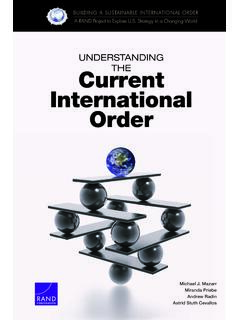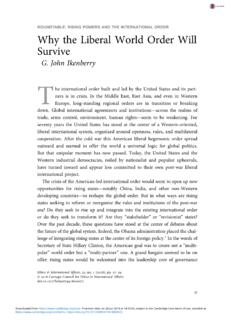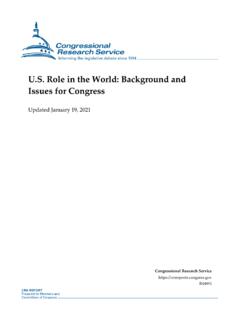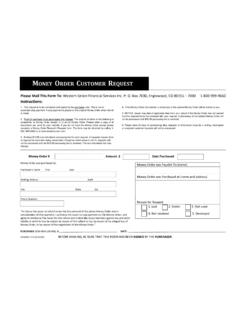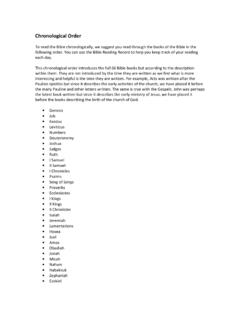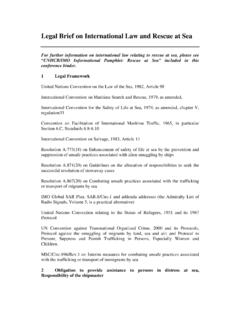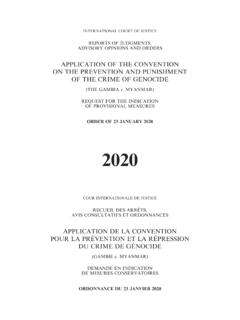Transcription of THE UNITED NATIONS AND THE RULES-BASED …
1 UNITED NationsAssociation of AustraliaTHE UNITED NATIONS AND THE RULES-BASED international ORDERE xecutive Summary 3 Overview 4 Australia and the UNITED NATIONS 5 The UNITED NATIONS and the RULES-BASED international order 7UN reform 13 Peace and security a safer world 16 Human rights and humanitarian action a fairer world 19 Global Development a more sustainable world 20 Conclusion 23 More than ever the UNITED NATIONS needs Australia ..and Australia needs the UNITED G SMITH, ON ELECTION AS UNAA NATIONAL PRESIDENT, AGM, MELBOURNE, 4 SEPTEMBER paper is based on client advice prepared for Mr Luke Gosling MP, Federal Member for Solomon, by the Australian Parliamentary Library. The UNAA is grateful to Mr Gosling for making the original advice available, and UNAA acknowledges the useful background work of the Parliamentary Library.
2 Any errors in the document, however, should be attributed to Cover: UN Photo Lamphay Inthakoun This Page: UN Photo/Yutaka NagataA concept gaining increasing currency both in Australia and internationally is that of a RULES-BASED international order . This means a shared commitment by all countries to conduct their activities in accordance with agreed rules that evolve over time, such as international law, regional security arrangements, trade agreements, immigration protocols, and cultural arrangements. As demonstrated since the formation of the UNITED NATIONS following the Second World War, a RULES-BASED international order is the only alternative to international coercion by competing great powers, spheres of influence, client states and terrorist organisations. Moreover, global development through the achievement of the sustainable development goals (SDGs) can only occur within a RULES-BASED international system based on commitment and respect.
3 An effective RULES-BASED international order depends largely on the professionalism and neutrality of the UNITED NATIONS , and the effectiveness of the UNITED NATIONS depends mostly on the commitment by its Member a medium power, Australia has a profound interest in promoting multilateral diplomacy and actions to preserve and strengthen the RULES-BASED international order . The UNITED NATIONS has proved to be a force multiplier for many countries including Australia: by providing global contributions to peace and security, sustainable development, humanitarian relief and human rights. In the Asia-Pacific region alone, Australia has frequently benefited by pursuing its national security interests through the UNITED NATIONS ; as evidenced by Australia s support to Indonesia for its independence, the Korean War, the peace process and elections in Cambodia, and events leading to the independence of Timor-Leste.
4 Continuing reform of the UNITED NATIONS including along the lines suggested by the international Commission on Multilateralism1 will be required if the Organisation is to fulfil its Charter, so skilfully crafted and agreed in October 1945 following the horrors of the Second World War. Notably, Australia played an influential role in the formation of the UNITED NATIONS , and continues to support the Organisation as its 11th highest financial contributor. While the world has changed remarkably since the Charter was enacted, and the UN s membership almost quadrupled, the necessity for the existence of the UNITED NATIONS has not diminished. Overall, the UNITED NATIONS has served humanity well, despite the Organisation s limitations and imperfections. A world without the UNITED NATIONS and a RULES-BASED international order would be even more troubled, insecure and poorer than it is.
5 This paper outlines the critical role of the UNITED NATIONS in enhancing the RULES-BASED international order , and contributing to a safer, fairer, and more sustainable world. The paper outlines the major organisational entities that the UNITED NATIONS comprises, convenes or contributes to; reminds all Australians of the critical role that the UNITED NATIONS plays in the RULES-BASED international system; and advocates that it is in Australia s national security interests to contribute to, and strengthen, the UNITED NATIONS . The paper also highlights Australia s continuing support for the Organisation since its formation in 1945. Comments and suggestions to improve the paper are welcomed at 1 Independent Commission on Multilateralism (ICM), Pulling Together: the multilateral system and its future, New York: international Peace Institute, September 2016. EXECUTIVE SUMMARYUNAA UN RULES-BASED international order | 3 The UNITED NATIONS provides a platform for Member States, both large and small, to have a voice.
6 UN membership has grown from its original 51 members in 1945 to 193 members in 2017, with the newly formed states of Timor-Leste and South Sudan amongst the most recent members. The Organisation s work is guided by its Charter, skilfully crafted at Dumbarton Oaks, Washington in 1944 in the horrific shadows of the Second World War, and completed in San Francisco in 1945. Amendments to the Charter can be made by a vote of two thirds of the members of the UN General Assembly (UNGA), which has occurred on three occasions (1963, 1968 and 1971). Predictably, many Member States have argued that UN structures as stated in the Charter are outdated. The main organs of the UNITED NATIONS are the UNGA, the Security Council (UNSC), the Economic and Social Council, the Trusteeship Council, the international Court of Justice (ICJ), and the UN Secretariat. While it is widely accepted that changes are needed, reforming the UNITED NATIONS is difficult, although not impossible.
7 The UNITED NATIONS exists and performs to the extent permitted by its Member States, and continuous reform and debate on improving the UN system has occurred since its formation. While the UNITED NATIONS is an imperfect system, its multilateral diplomacy and critical field work remain vital for international security, humanitarian action, human rights and sustainable development. Millions of people around the world are vitally dependent on the UNITED NATIONS , which is of central importance to the effectiveness of a RULES-BASED international paper outlines the critical role of the UNITED NATIONS in enhancing the RULES-BASED international order , and contributing to a safer, fairer, and more sustainable world. The paper outlines the major organisational entities that the UNITED NATIONS comprises, convenes or contributes to; reminds all Australians of the critical role that the UNITED NATIONS plays in the RULES-BASED international system; and advocates that it is in Australia s national security interests to contribute to, and strengthen, the UNITED NATIONS .
8 The paper also highlights Australia s continuing support for the Organisation since its formation in | UNAA UN RULES-BASED international ORDERUN Photo / Tobin JonesAustralia has a long history of active involvement in the UNITED NATIONS : as a founding member in 1945, and on five occasions as a non-permanent member of the UNSC 1946-47, 1956-57, 1973-74, 1985-86 and 2013-14. During its formation, and led by the Minister for External Affairs, Dr H. V. Evatt, the Australian delegation played an instrumental role in framing the UN Charter. The UNITED NATIONS officially came into existence on 24 October 1945 upon ratification of the Charter by the permanent five members (P5) UNITED States, Soviet Union (now the Russian Federation), UNITED Kingdom, France and China and 41 other countries. On 17 January 1946, the UNSC met for the first time at Church House, Westminster, in London, UNITED Kingdom.
9 As an acknowledgement of Australia s contribution, Australia was elected to the Executive Committee of the UN Preparatory Commission, to the first UNSC, to the Economic and Social Council, and to the first Commission on Human Rights (CHR). Evatt himself was elected as President of the UNGA in 1948. Successive Australian governments have placed varying degrees of importance on the UN system and its subsidiary organs, but have continuously supported the Organisation and its need for reform. In 2017, Australia is the 11th largest financial contributor to the UNITED NATIONS . Australia has consistently supported the UN s peace and security initiatives, but unlike many other countries Australia has filled very few senior posts (civilian and military) in the Organisation. In field operations, Australia has provided some military Force Commanders and Police Commissioners, but is yet to provide a Mission leader a Special Representative of the Secretary-General (SRSG).
10 In recent years, Australia s important contribution to UN peace operations has seriously declined and Australia is currently ranked 85th amongst Member States. In September 2017, Australia will celebrate 70 years 2 The Memorial is dedicated to all Australian peacekeepers: military, police and civilian. While most peacekeepers have served under the UN flag, Australia has also provided peacekeepers to non-UN missions, such as Somalia, Sierra Leone, Bougainville and the Solomon its commitment to UN peacekeeping, which commenced in Indonesia in 1947. To commemorate this, the Australian Peacekeeping Memorial will be unveiled on ANZAC Parade in UN s Charter begins with the critical words we the Although comprised of Member States, the UN s founders also believed it important that civil society around the world should have active representation and involvement.
